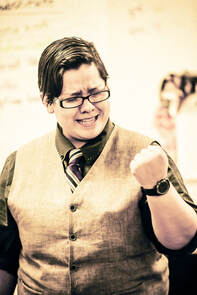DUDL POetry

Poetry gives students the opportunity to interpret and perform poetic literature. The Poetry category will now include both original poetry authored by the performer and published* poetry. Material does not have to be memorized, but memorization is encouraged.
Competitors will enter room as a group. Some competitors might be “double entered” in other speaking events and have to arrive late, or leave early. Students may watch the other competitors perform. Please consider the following when judging the speakers. Competitors may enter as an individual only. Speaker points are ranked out of 100, with the typical range being 70-100.
Competitors will enter room as a group. Some competitors might be “double entered” in other speaking events and have to arrive late, or leave early. Students may watch the other competitors perform. Please consider the following when judging the speakers. Competitors may enter as an individual only. Speaker points are ranked out of 100, with the typical range being 70-100.
Introduction:
- Does the introduction state the title of the piece?
- Is it effective, explanatory, attention-getting?
- Does it set the right mood/feeling?
Literary Merit:
- Does the material demonstrate a creative and compelling use of language?
- Does the author/performer possess a unique literary voice/perspective?
- Does the poem have an impact on the audience?
Performance:
- Vocalization - Volume, emphasis, intensity, diction, inflection, mumbling, speed/pacing, expressiveness, projection, enunciation, pitch
- Phrasing/pacing - Fluid, choppy, flowing, rhythmic, hesitant
- Eye contact - consistent, effective
- Facial expressiveness/gestures - natural, appropriate, expressive
- Speaker presence - Confident, poised, energetic, polished, lackadaisical, comfortable with material
- Emotion - appropriate to selection, believable, intensity, tone
- Transitions - fluid, explanatory
